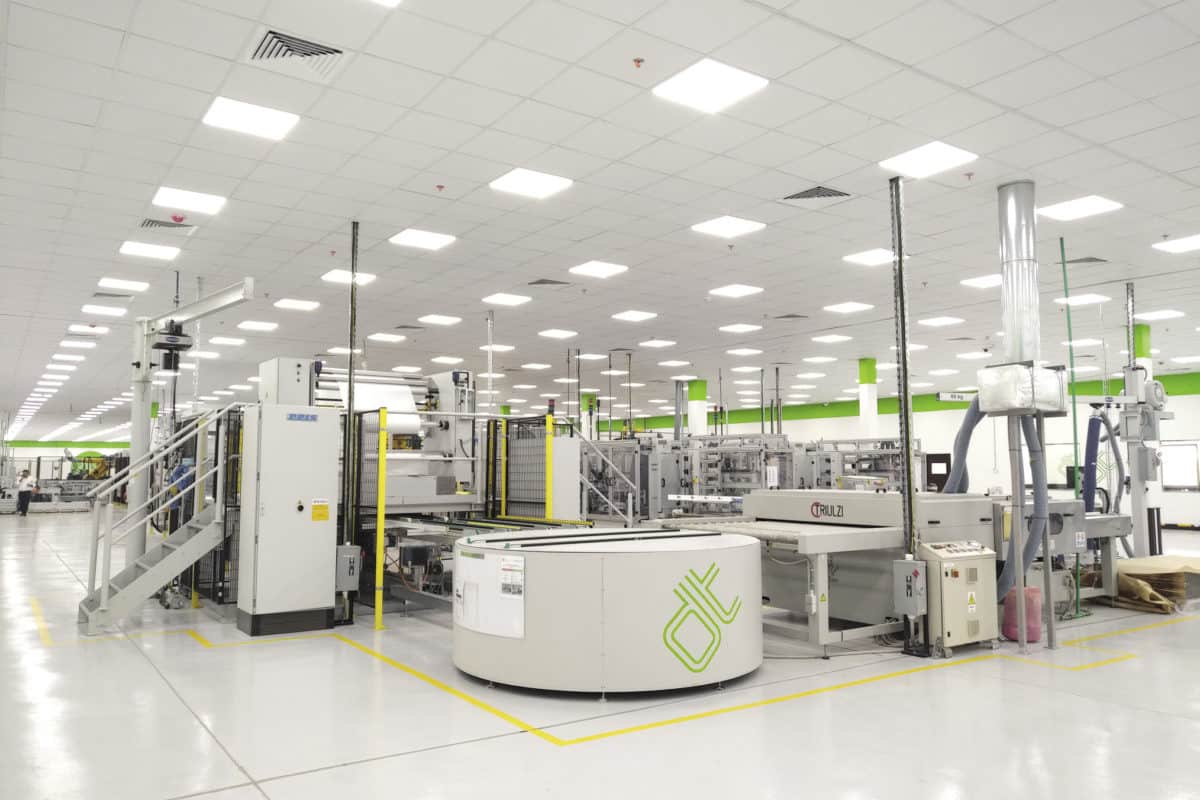Saudi Arabia’s digital transformation journey… Superior services and advanced global centers

Despite the negative impact of the coronavirus pandemic on the whole world, including Saudi Arabia, those who live in the land of the Kingdom have found themselves among the least affected by this pandemic.
One of the top reasons is the government’s decision to take precautionary measures to protect the lives of citizens and residents.
These measures included the suspension of in-person work in many government agencies and departments. Those dealing with those agencies and departments found themselves not obliged to stop their work, but all they had to do was download the application and work from their homes.
Saudi superiority in this aspect was supported by the digital infrastructure, which the state established over the past years, which allowed it to launch many applications and programs that helped facilitate people’s lives.
Vision 2030: The starting point
One of the most important goals of Vision 2030 and the National Transformation Program was for the Kingdom’s government to become a “paperless government.”
Although this seems easy with the technological progress we live in, it is not a simple task, especially with the tremendous amount of information and data that government relies on.
Billions of papers had to be digitalized, converting the information on them into a digital form. Afterwards, the government would be able to switch operational processes from traditional to digital.
Digital transformation is a comprehensive transformation in re-designing business models to modern models that employ data and digital developments, and all of this requires several years of continuous work.
Despite the pandemic, the Kingdom’s strong digital infrastructure contributed to accelerating the process of digital transformation, as it allowed Saudi Arabia to confront crises that disrupt all services in the public and private sectors.
The strong digital infrastructure also contributed to the continuity of business and educational processes and all the requirements of the daily life of citizens and residents amid the pandemic. The Kingdom has been ranked among the top 10 developed countries in the world due to its strength in digital infrastructure.
National Digital Transformation Unit
One of the most important things that Vision 2030 has done is that it made government work a participatory work and not at the level of individual ministries. Accordingly, the National Digital Transformation Unit was established in 2017.
The National Digital Transformation Unit is one of the governmental arms to achieve the Kingdom’s Vision 2030.
Because digital transformation is a key pillar for realizing the Kingdom’s Vision 2030, the National Digital Transformation Unit works hand in hand with digital transformation partners to accelerate and enable digital transformation in the Kingdom. The Unit aims at realizing many accomplishments through a national digital perspective that reflects our digital vision.
This unit aims, from the first day, to build a digital society, a digital economy, and a digital homeland in a way that ensures the transformation into a digital society. This is based on the creation of digital platforms to enrich interaction and effective community participation, thus contributing to improving the experience of the citizens, residents, tourists and investors in the Kingdom.
It also aims to realize a digital economy to develop the industry, improve competitiveness, have a positive impact on the economic situation, generate knowledge jobs, provide better services to beneficiaries, and a digital home to stimulate creativity by attracting local and global investments and partnerships in the fields of technology and innovation.
Illiteracy for countries at present no longer means those that do not use computers (computer illiteracy), as it was in the last decade of the last century, nor do countries where a large number of their people do not know how to read and write (alphabetical illiteracy), as it was in decades. Illiteracy now means digital illiteracy, which is what all countries, including the Kingdom, are currently striving to eradicate.
Figures and Statistics
Several studies indicate that digital readiness and digital awareness in governments have risen to new levels at the global level, with the support of rapid technological developments, and the pursuit of keeping pace with those developments.
In Saudi Arabia, the data shows that the digital economy currently represents 12-15% of the GDP, and the Kingdom aspires to reach 25% in the year 2025.
The Kingdom also aspires to raise the contribution of financial technology to the GDP from $1 billion to $1.2 billion by 2025, while raising jobs provided from 5.2 to 6.2 million in the same period.
Saudi Arabia has become the first globally in 5G speeds, second in cybersecurity, third in employing modern technologies to contain the coronavirus pandemic, seventh in financing technical development, 9th in the application and development of technology and 10th within the G20 in the index of capabilities and human capital.
The Kingdom also ranked within the top 10 in average mobile internet speeds in the latest index, while in 2017, it was outside the top 100 countries.
In digital competitiveness, Saudi Arabia has jumped from 39 to 34 and is expected to be in the top twenty places before 2030. It has leapt to 43rd place in the digital e-government index and aspires to reach the top twenty. The Kingdom has achieved a qualitative leap by 40 places on the United Nations sub-index in “Digital Infrastructure” to be ranked 28th in the world, and 8th within the G20 countries.
At the same time, the Kingdom made another leap at the level of the “human capital” sub-index. The Kingdom advanced 15 places to 35th globally, and tenth among the G20 countries. The Kingdom ranked 62nd on the Doing Business Index, 30 places ahead of 2019. The volume of e-commerce increased by 322% in the third quarter of 2020 compared to the corresponding quarter of 2019.
Riyadh ranked 10th out of 193 cities around the world in the technology sub-index and 31st globally in competitiveness between cities, and this came in conjunction with its coronation as the first Arab digital capital in the year 2020.
Kingdom aims to become the leading country in digital transformation
Saudi Arabia was the first country to launch a digital economy policy, which proves its committment to achieving its digital transformation goals. This policy covers a set of standards from data freedom, optimal use of artificial intelligence, and the empowerment of women and youth. It was also the first of the G20 countries in the upward digital transformation, as it jumped 149 places. In the Doing Business 2020 report issued by the World Bank, the Kingdom ranked first in the world among 190 countries on the Business Environment Reforms Index.
And Saudi Arabia was the first country to use “blockchain” in the scope of global trade outside the work of banks, according to Mohammad Shihab, Managing Director, Maersk Saudi Arabia. The Saudi Customs Authority launched the first shipment from King Abdulaziz Port in Dammam to the Port of Rotterdam in the Netherlands on May 12, 2019, using the blockchain system.
Five-year plans
These achievements were the results of the national strategies for digital transformation and promising and ambitious five-year plans adopted by the Kingdom. Saudi Arabia has developed executive plans, the third of which is currently underway, which started in 2019 and continues to 2022, and among its most prominent strategic plans: Digital Health, digital education, digital commerce, and smart cities.
Quality initiatives
The open data platform in the Kingdom of Saudi Arabia is one of the important initiatives. It provides a government database and works on developing a general strategy to enable transparency, encourage electronic participation, and stimulate creativity. The platform contains thousands of financial and statistical data on various fields and activities in the country. Open data is data that anyone can use freely and without technical, financial or legal restrictions.
Another initiative is the Digital Giving Initiative, which aims to spread digital awareness and digital literacy by building a voluntary community of trainers and volunteers for the digital knowledge industry and sharing it with various segments of society through events and training programs. There is also the Think Tech initiative, which aims to spread awareness of the technologies of the Fourth Industrial Revolution to achieve sustainable development.
Yesser Program and Digital Inclusion
According to the United Nations report issued in June 2019, the team on digital transformation believes that digital technologies will not be able to stimulate progress towards the full implementation of the sustainable development goals unless our thinking goes beyond the issue of access to the Internet and technologies. However, this needs to be followed by collaboration on the broader ecosystems that enable the holistic use of digital technologies. Or what we can call “digital inclusion”, which is what the above indicates that the Kingdom is qualified for.
The Kingdom seeks to empower government agencies digitally through several programs provided by the e-Government Program (Yesser), aiming to provide easy-to-access services to citizens.
The Ministry of Communications and Information Technology had launched Yesser; To lead the digital transformation of government agencies in the Kingdom of Saudi Arabia, and improve their services by empowering and motivating them to provide sustainable integrated technology solutions.
According to those in charge of the Yesser Program, there are 400 government agencies in the Kingdom, of which more than 220 work daily with each other to provide services to the beneficiaries. This facilitates work within each of these entities on the one hand and facilitates the provision of joint services with other entities on the other hand. The Kingdom currently has more than 3,300 e-services provided by more than 188 entities through more than 120 government applications.
Those in charge of the “Yesser” program are working to establish the “Unified National Platform”, which works to unify the applications that provide government services in all agencies, making it easier for beneficiaries to use those applications.
Digital Government Authority
The Saudi Cabinet, headed by the Custodian of the Two Holy Mosques, King Salman bin Abdulaziz Al Saud approved at the beginning of March 2021 the establishment of the Digital Government Authority.
The most important tasks of the authority are to participate in preparing the national strategy for digital government, organizing digital government work, platforms, sites, services and digital government networks. The authority is also tasked with following up and setting technical standards for government digital transformation models, issuing measurements, indicators, tools and reports to measure the performance of government agencies, in addition to governance of government digital cloud and clouds business.
The authority builds specialized national capacities in the digital government to adopt and enable modern technologies, in addition to approving policies related to the authority’s activities and the plans, programs and projects needed to implement them. All these tasks aim to enhance the digital government experience and raise the level of digital services to the aspirations of citizens, residents and visitors.
Smart government…The next step
The Kingdom is currently planning to move from e-government to smart government, which is the most advanced form of government services that the world has reached. The difference between e-government and the smart government is that the first means the citizen’s ability to carry out government transactions via the Internet, such as obtaining a passport, identity and others through the websites of government agencies.
On the other hand, the smart service is a proactive service, which distinguishes it from the electronic service, in addition to being highly reliable as well as supportive of decision-making by the beneficiaries.
The smart service decides on behalf of the government entity and the beneficiary as well, and the smart service can ensure that the user of this service is the owner of the correct legal capacity and no one is doing this on his behalf.
Desired results of digital transformation
In addition to facilitating the lives of citizens and residents in the Kingdom, by facilitating the way government services are provided to them, there are many desired economic benefits through digital transformation.
For example, in 2018, the Saudi Central Bank signed an agreement with the American company Ripple to use the company’s technologies in external transfers between banks using Blockchain technology, in order to reduce the cost of transferred funds by 10%.
According to Moody’s credit rating agency, this would save between $200-400 million annually for Saudi banks, which can be compared to other fields.





